Press
The media plays a crucial role in our commitment to Never Again. We work closely with our media partners to advance awareness and drive the narrative on the Yazidi Genocide. Yazda is widely quoted and cited in the global press. Thank you to our media partners for your persevering commitment to the Yazidi Cause.
We welcome media inquiries here.
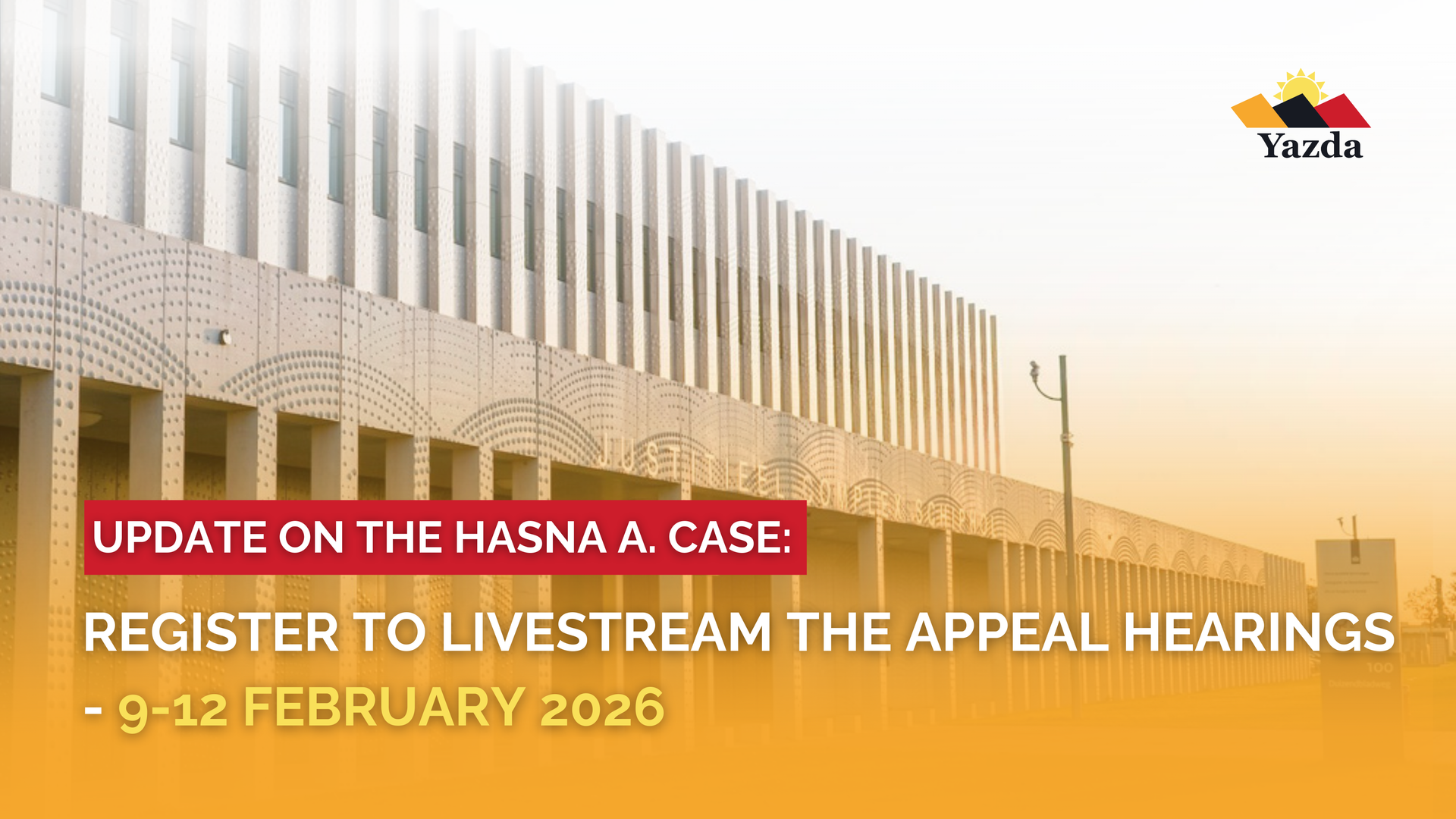
Date: 26 January 2026 Netherlands: The Court of Appeal at the Schiphol Judicial Complex will review the Hasna A. case, a landmark case involving crimes against the Yazidi community. The court made its first decision in December 2024. The defense has asked for the decision to be reviewed, hence the appeal hearings are scheduled to take place from 9 to 12 February 2026. Hasna A., a 33-year-old Dutch woman, travelled from the Netherlands to Syria in 2015 with her young son, where she married an ISIL member. She was repatriated to the Netherlands in late 2022 along with other women and children from camps in northern Syria, then arrested and charged under Dutch law. Hasna A.'s trial began in the Hague in October 2024. On 11 December 2024, the Court of First Instance delivered its verdict , sentencing her to ten years’ imprisonment for: 1) Crimes against humanity of enslavement; 2) Membership in a terrorist organisation (ISIL); 3) Participation in and promotion of terrorist crimes; and 4) Child endangerment. The case marked a milestone, as it was the first time an individual was prosecuted and convicted in the Netherlands for crimes committed against the Yazidi community. The forthcoming appeal hearings will be open to the public in person at the Court of Appeal at the Schiphol Judicial Complex and via livestream in Dutch with interpretation in Kurmanji. To request access to the live stream, please send an email to info@yazda.org with the subject line “Hasna A. case Livestream”. Once registered, you will be sent a secure link that will allow you to watch the screening. If you face any issues receiving the link, you can reach out to us at the same email address. Natia Navrouzov, Executive Director at Yazda, commented: “For Yazidi survivors, following justice processes can be deeply meaningful, but also emotionally difficult. By making the appeal hearing accessible, just as during the first-instance proceedings, through livestream, the Netherlands has taken an important step toward survivor-centered justice, one that for now remains rare. This access allows survivors to stay informed in ways that respect their choices and well-being. Yazda is committed to supporting survivors and affected communities to follow these proceedings safely, with language access, and with proper explanations.” Further updates, including the outcome of the appeal, will be shared with the community in due course. *** -END- Download this Press Release here . Read this Press Release in Arabic here. ### About Yazda: Yazda is a non-governmental, non-profit organization that was established in 2014 in response to the genocide committed by the self-declared Islamic State (ISIS) against the Yazidis and other minorities in Iraq. Yazda manages a portfolio of humanitarian, justice, advocacy, and development-related projects, all of which are community and survivor-centered in terms of design and implementation. Since its inception, Yazda has been working with local and international partners to provide humanitarian, accountability, and advocacy services to vulnerable minority groups in Iraq in their post-genocide recovery. The organization has been operating in Iraq since October 2014 and has main offices in Duhok in the Kurdistan Region of Iraq and a branch office in Sinjar in Nineveh Province. Yazda is registered as a non-profit organization in the United States, the United Kingdom, Iraq, Kurdistan Region of Iraq. Over the past 8 years, Yazda has grown to employ around 80 staff on average, received support from numerous donors, both institutional and individual, and has reached tens of thousands of direct and indirect beneficiaries through its programs and initiatives.
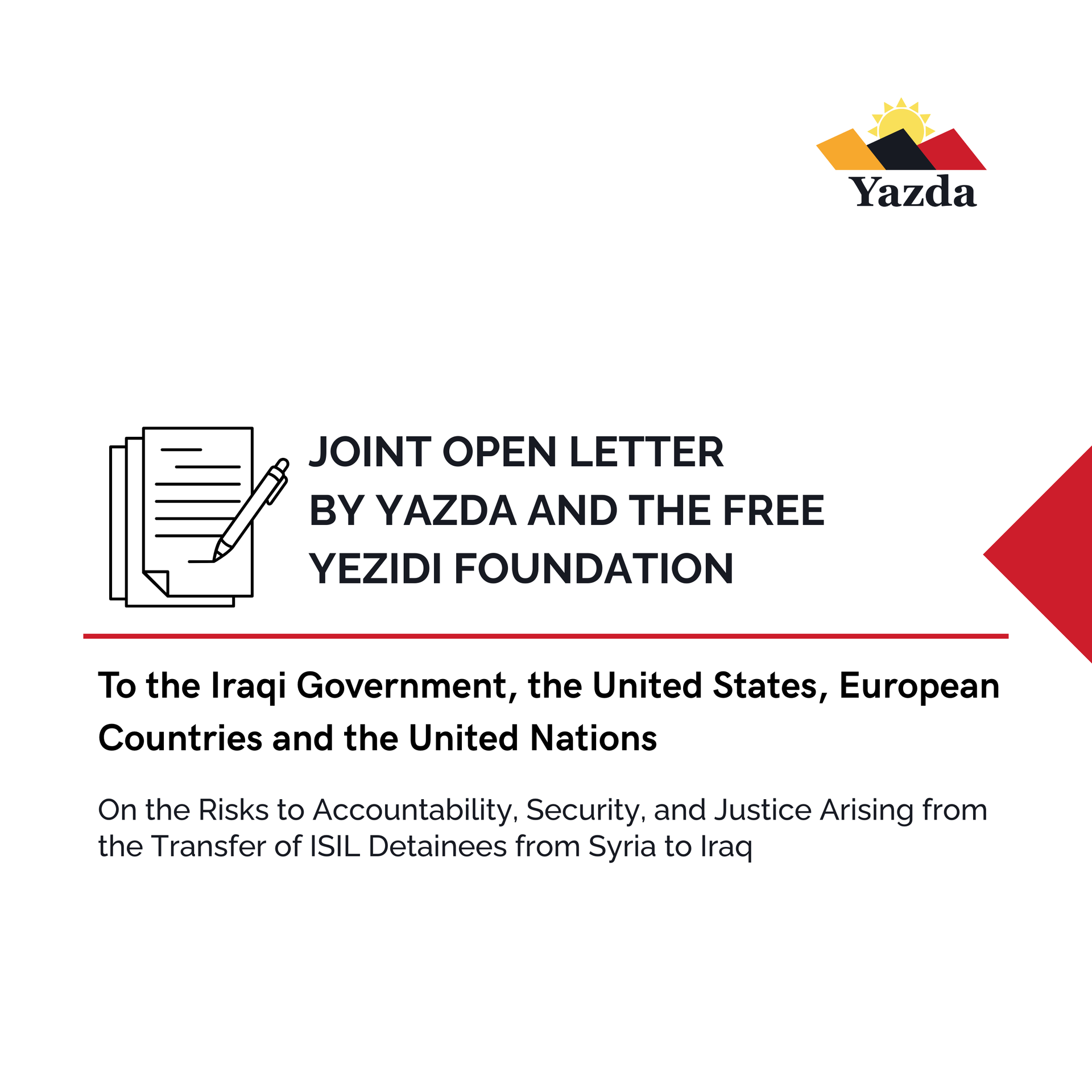
January 23, 2026 Joint Open Letter By Yazda and the Free Yezidi Foundation to the Iraqi Government, the United States, European Countries and the United Nations On the Risks to Accountability, Security, and Justice Arising from the Transfer of ISIL Detainees from Syria to Iraq We, the undersigned organizations, write to express our deep concern regarding the transfer of ISIL detainees from northeastern Syria to Iraq at a time of heightened regional instability. According to publicly available information , 150 ISIL detainees have already been transferred, and plans are reportedly underway that could involve the transfer of up to 7,000 ISIL prisoners, including Foreign Terrorist Fighters (FTFs). Although we recognize the complex security challenges faced by Iraq and its partners, large-scale transfers carried out without an internationally supported accountability framework risk undermining justice efforts, regional and global security, social cohesion, and long-term stability. These transfers are taking place amid ongoing attacks by Syrian Government forces and affiliated armed groups against the Syrian Democratic Forces (SDF) that had been holding ISIL detainees for several years. The attacks are affecting detention facilities and displacement camps. This includes Al-Hol camp, which continues to host tens of thousands of individuals with alleged ISIL links and has long been recognized as a highly fragile environment with significant protection and radicalization risks. The deteriorating security environment in northeastern Syria heightens the risk of ISIL and extremist resurgence, posing a direct threat to civilians, including ethnic and religious minorities, such as Yazidis, in both Syria and Iraq. In this context, the movement of large numbers of ISIL detainees raises legitimate concerns about safety, oversight, and Iraq’s capacity to manage, without sustained international support, a significantly increased number of ISIL prisoners while ensuring meaningful accountability. We therefore underscore the urgent need for full transparency, coordination, and international engagement throughout the process, including sustained support for the SDF, who for more than a decade have played a critical role in protecting civilians, securing detention facilities, and preventing ISIL resurgence on behalf of the international community. Our organizations were established in direct response to ISIL’s genocide against the Yazidi community and its systematic targeting of all those who opposed or did not conform to its extremist ideology. For more than a decade, together with survivors from Yazidi, Christian, Shia Turkmen, Shabak, and other affected communities, we have consistently called for accountability that reflects the full scope and gravity of ISIL crimes. To date, accountability efforts have remained limited. In Iraq, ISIL members have largely been prosecuted under terrorism-related charges, leaving core crimes, such as genocide, crimes against humanity war crimes, sexual violence, killings, torture, enslavement, forced indoctrination and militarization, and forced displacement, unaddressed in judicial proceedings. This approach has prevented the establishment of an authoritative judicial record of ISIL crimes committed against all affected communities and has excluded survivors from meaningful participation in justice processes. Accountability for ISIL crimes is not only a legal obligation but a necessary foundation for reconciliation, sustainable peace and global security. Prosecuting ISIL members for genocide, crimes against humanity, and war crimes is essential to reveal the systematic and multi-community nature of ISIL violence, counter denial and historical distortion, and ensure that responsibility is attributed to individual perpetrators rather than entire communities. Credible justice processes can therefore reduce grievances, prevent collective blame, strengthen trust in state institutions, and contribute to long-term stability and non-recurrence. While we are deeply concerned by current developments, particularly the rise of extremist behaviour and targeted attacks against ethnic and religious minorities, we also recognize that this presents an important moment for Iraq to combat impunity. Iraq has taken meaningful steps toward recognition and accountability for ISIL crimes, including the adoption of a groundbreaking reparations framework, the Yazidi Survivors Law, and ongoing efforts to exhume mass graves of ISIL victims across the country. These exhumations are uncovering critical evidence of atrocities committed against multiple communities and underscore the urgent need for prosecutions that reflect the full extent of these crimes. Without corresponding judicial processes that hold perpetrators individually responsible, these efforts risk remaining incomplete and falling short of survivors’ expectations for justice and truth. Iraq’s recent election to the United Nations Human Rights Council for the 2026-2028 term and its National Action Plan on Human Rights further provide a framework for strengthened international cooperation on accountability. With coordinated international support, Iraq can transform these efforts into a comprehensive justice process that establishes the truth about ISIL crimes against all affected communities, strengthens social cohesion, and contributes to durable peace and non-recurrence. Despite the passing of time, survivors continue to express a clear and consistent demand for justice. In a recent survey conducted by Yazda with 601 survivors, more than 98% emphasized the importance of prosecuting ISIL members for genocide and crimes against humanity, and 95% rejected any form of amnesty. These views reflect not only a desire for accountability, but for truth, recognition, and a future free from recurrence. In light of the above, we respectfully call for the following actions: To the Iraqi Government Ensure full transparency and oversight regarding any transfer of ISIL detainees from Syria to Iraq, including public clarification of the number and nationality of detainees, and applicable legal safeguards, in coordination with relevant international partners and institutions. Establish and apply rigorous vetting, screening, and classification procedures for all transferred detainees, with international technical support as needed, to assess individual criminal responsibility, distinguish between levels of involvement, identify suspects responsible for core international crimes, and ensure that those most responsible are prioritized for prosecution. Guarantee that no form of amnesty, pardon, or early release is granted to individuals responsible for genocide, crimes against humanity, and war crimes, and publicly reaffirm Iraq’s commitment to accountability in line with international law and survivor expectations. Adopt comprehensive legislation incorporating genocide, crimes against humanity, and war crimes into national law, ensuring that ISIL crimes are prosecuted in their full scope and that judicial proceedings contribute to truth-telling, reconciliation, and social cohesion. In this regard, the existing draft law prepared by the Committee on International Humanitarian Law linked to the Prime Minister’s Office should be formally transmitted to Parliament for discussion and adoption as a matter of priority. In parallel with domestic efforts, explore complementary international accountability pathways, including cooperation with the International Criminal Court (ICC). This could include lodging a declaration under Article 12(3) of the Rome Statute to accept the Court’s jurisdiction, and referring at least one high-level ISIL member for prosecution, thereby providing an international judicial platform that would draw global attention to ISIL crimes, reinforce the rule of law, and contribute to countering radicalization by publicly exposing and condemning the group’s atrocities. To States Provide sustained support to the SDF and relevant civilian authorities responsible for securing ISIL detention facilities and displacement camps in northeastern Syria, while prioritizing the protection of civilians and preventing actions that risk destabilizing these facilities, enabling escapes, or contributing to renewed ISIL and extremist activity. Provide sustained, predictable, and coordinated legal, technical, financial, and political support to Iraq, including support for judicial reform, specialized war crimes units, forensic and investigative capacity, detention management, and witness and survivor protection, to ensure fair trials that meet international standards. Support transparency and accountability mechanisms related to detainee transfers, including monitoring arrangements and information-sharing frameworks, and continue to support partners responsible for securing detention facilities and protecting civilians from ISIL and extremist threats. Repatriate their nationals detained in Syria or Iraq without delay and investigate and prosecute them for genocide, crimes against humanity, war crimes, and related offenses, or actively pursue cases under universal jurisdiction, thereby sharing responsibility for accountability and reducing pressure on Iraq’s detention and judicial systems. To the United Nations Support transparent, coordinated, and rights-respecting transfer processes, including by facilitating information-sharing, technical assistance, and international oversight where appropriate, to ensure that transfers contribute to accountability rather than impunity. Ensure timely, transparent, and survivor-centered access to evidence collected by the UN Investigative Team to Promote Accountability for Crimes Committed by Daesh/ISIL (UNITAD), so that national and international courts can effectively pursue accountability and establish a comprehensive historical record of ISIL crimes. Enhance coordination among relevant UN entities to support Iraq in managing the legal, security, and human rights implications of detainee transfers, with a focus on non-recurrence, social cohesion, and the protection of affected communities. We remain committed to constructive engagement with all stakeholders. Without coordinated, transparent, and survivor-centered action, the transfer of ISIL detainees risks repeating past failures and undermining prospects for justice, reconciliation, and peace. We therefore urge all concerned actors to act collectively and decisively to ensure that accountability for ISIL crimes against all affected communities is finally realized. Yazda Free Yezidi Foundation Download this joint letter in English here. Download this Joint Letter in Arabic here . ### For media inquiries, please contact: info@yazda.org About Yazda: Yazda is a non-governmental, non-profit organization that was established in 2014 in response to the genocide committed by the self-declared Islamic State (ISIS) against the Yazidis and other minorities in Iraq. Yazda manages a portfolio of humanitarian, justice, advocacy, and development-related projects, all of which are community and survivor-centered in terms of design and implementation. Since its inception, Yazda has been working with local and international partners to provide humanitarian, accountability, and advocacy services to vulnerable minority groups in Iraq in their post-genocide recovery. The organization has been operating in Iraq since October 2014 and has main offices in Duhok in the Kurdistan Region of Iraq and a branch office in Sinjar in Nineveh Province. Yazda is registered as a non-profit organization in the United States, the United Kingdom, Iraq, Kurdistan Region of Iraq. Over the past 8 years, Yazda has grown to employ around 80 staff on average, received support from numerous donors, both institutional and individual, and has reached tens of thousands of direct and indirect beneficiaries through its programs and initiatives.
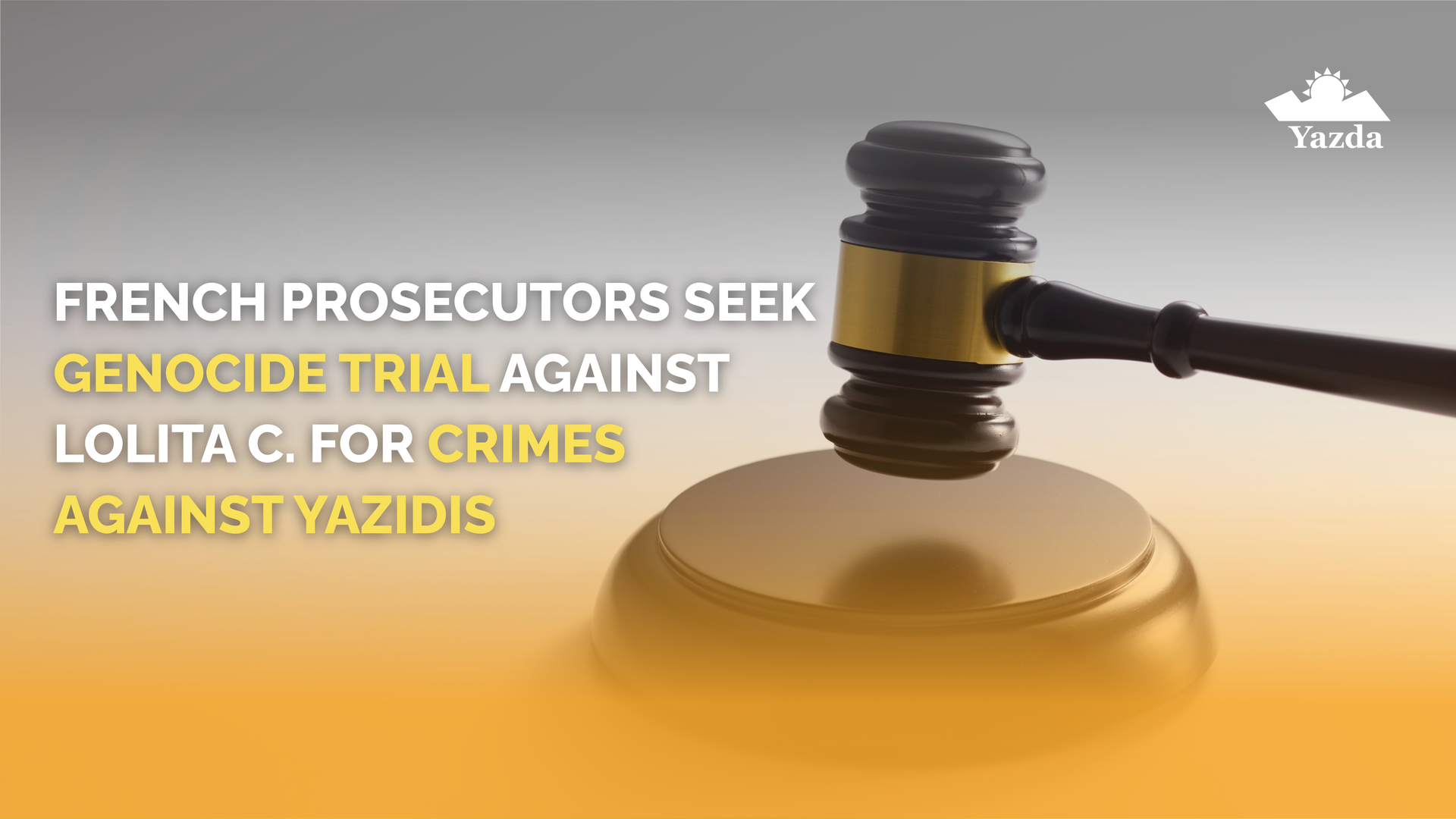
21 January 2026 On 19 January 2026, France’s National Anti-Terrorism Prosecutor’s Office (PNAT) requested that the case of French jihadist Lolita C. be referred to trial before the Paris special assize court (cour d’assises spéciale). She faces charges of complicity in genocide and crimes against humanity committed against members of the Yazidi community, as well as participation in a terrorist criminal association. Lolita C. left France for Syria in 2014, where she married ISIL fighter Lakhdar S. Prosecutors allege that in 2017 she held an enslaved eight-year-old Yazidi girl for more than one month before handing her over to her “owner,” an ISIL member from Saudi Arabia. Lolita C. returned to France in 2021. The prosecution acknowledged that the enslavement of Yazidis was intended, among other objectives, to ostracize them from their community, notably by forcing conversions to Islam and changing survivors’ names. However, the PNAT dropped several charges initially included in the indictment, including unlawful imprisonment, severe deprivation of liberty, and inhuman treatment. Natia Navrouzov, Executive Director at Yazda, commented: “The PNAT’s decision to refer this case to trial marks a significant step toward justice for Yazidi women and girls who were subjected to ISIL’s system of enslavement and abuse. By pursuing charges of complicity in genocide, French authorities recognize that participation in the enslavement of a Yazidi child forms part of a coordinated plan aimed at the destruction, in whole or in part, of the Yazidi community. We now call on the investigating judge to follow this request and ensure that this case proceeds to trial.” If referred, Lolita C. would become the second French woman to appear before a French assize court for alleged involvement in the genocide against the Yazidis. In May 2025, France’s highest court, the Court of Cassation, ordered the reconsideration of genocide charges against Sonia M., a French national affiliated with ISIL accused of enslaving a Yazidi adolescent girl in her household alongside her husband, also an ISIL member. Her trial could open in the first half of 2027. These proceedings come amid a broader moment of judicial reckoning in France for crimes committed against the Yazidis. From 16 to 20 March 2026, French national Sabri E. is scheduled to stand trial in Paris in what would be the first genocide trial ever held in France in relation to crimes committed against the Yazidi community. Sabri E., an ISIL member presumed dead, will be tried in absentia on charges of genocide and crimes against humanity committed against Yazidi women and children, marking a historic milestone for accountability and justice for Yazidi survivors -END- Download this press release here . Read this Press Release in Arabic here . ### For media inquiries, please contact: info@yazda.org About Yazda: Yazda is a non-governmental, non-profit organization that was established in 2014 in response to the genocide committed by the self-declared Islamic State (ISIS) against the Yazidis and other minorities in Iraq. Yazda manages a portfolio of humanitarian, justice, advocacy, and development-related projects, all of which are community and survivor-centered in terms of design and implementation. Since its inception, Yazda has been working with local and international partners to provide humanitarian, accountability, and advocacy services to vulnerable minority groups in Iraq in their post-genocide recovery. The organization has been operating in Iraq since October 2014 and has main offices in Duhok in the Kurdistan Region of Iraq and a branch office in Sinjar in Nineveh Province. Yazda is registered as a non-profit organization in the United States, the United Kingdom, Iraq, Kurdistan Region of Iraq. Over the past 8 years, Yazda has grown to employ around 80 staff on average, received support from numerous donors, both institutional and individual, and has reached tens of thousands of direct and indirect beneficiaries through its programs and initiatives.
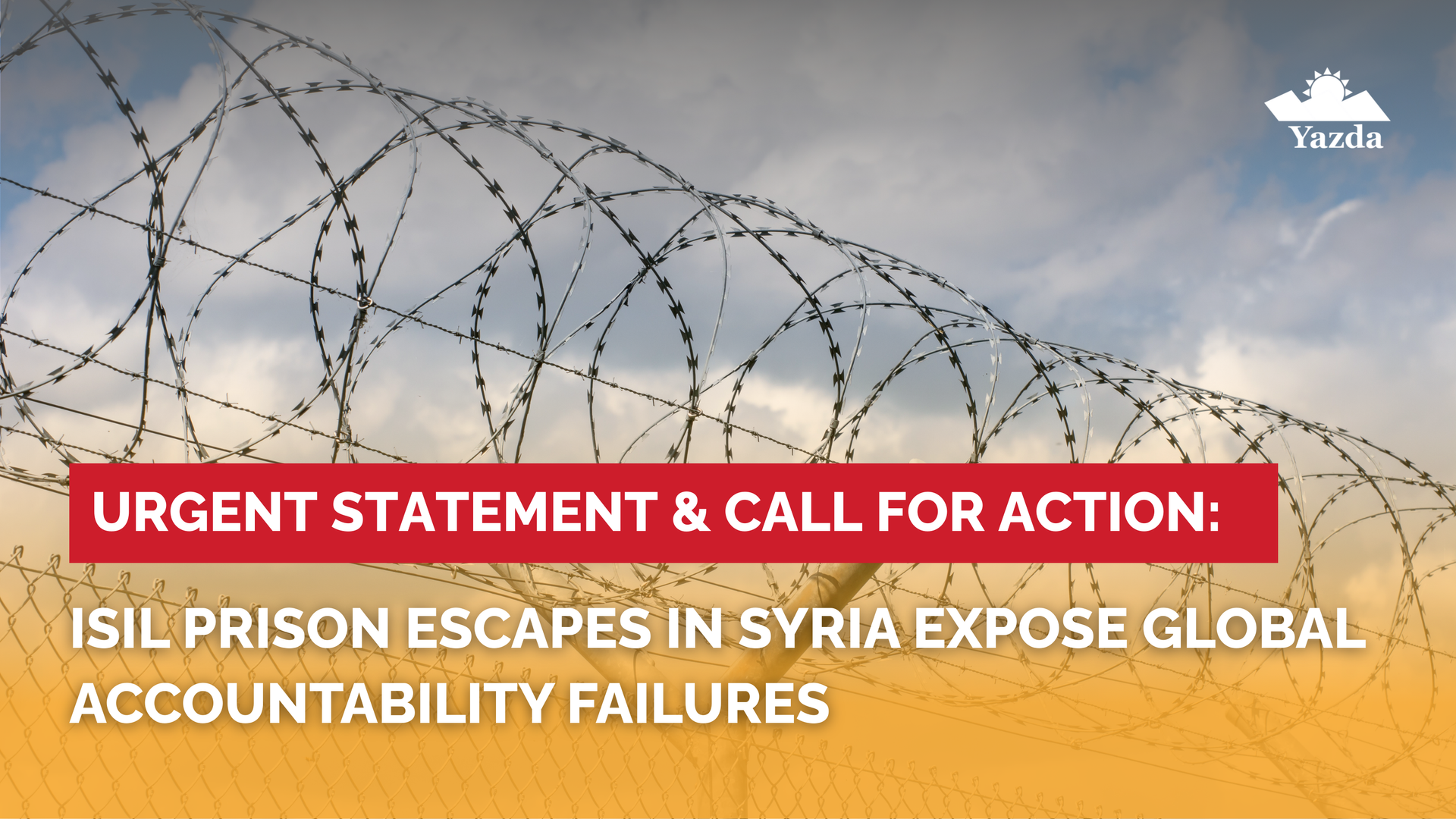
20 January 2026 Yazda expresses grave concern following today’s statement from Syria’s Interior Ministry reporting the escape of at least 120 ISIL detainees from Shaddadi Prison in Hasakah province, a detention facility under the control of the Syrian Democratic Forces (SDF). Authorities report that 81 detainees have since been recaptured. The SDF, however, reports that the number of escapees is significantly higher - up to 1,500 individuals - following an intense attack by government-aligned fighters that caused a collapse in security and temporary loss of control of the prison, an allegation denied by the Syrian army . Those who escaped are believed to include some of ISIL’s most hardened operatives. The breach follows further security incidents, including a coordinated attack on Raqqa’s Aqtan Prison yesterday , involving drones and heavy weapons, and followed by renewed shelling of the facility today . These attacks occur in the context of ongoing clashes between the SDF and Syrian government forces that have escalated since late 2025 and continued into early 2026, putting at risk civilians and further destabilizing already fragile security conditions in northeastern Syria, including areas around Aleppo and Hasakah. This instability must also be understood in the context of a longstanding failure to address accountability for ISIL crimes. ISIL controlled large parts of Syria from 2013 to March 2019, after which thousands of its members were detained in camps and prisons, largely overseen by the SDF. Despite repeated warnings from civil society organizations and survivors, the international community has failed to establish a sustainable, coordinated mechanism to prosecute ISIL suspects for international crimes, in line with international legal standards. The recent events demonstrate that more than one year after the fall of the Assad regime, a growing security vacuum continues to expand, posing serious threats to civilians and already affected communities, particularly minority groups. Yazda urgently calls on: The immediate protection of civilians in Rojava and other conflict-affected areas, alongside urgent measures to de-escalate hostilities and prevent further violence. The United Nations and the international community, particularly the United States, the European Union, Turkey, Qatar, and other states with influence in the region, to immediately ensure that all detention facilities holding ISIL members in northeastern Syria are secured and protected from the impact of ongoing hostilities. Yazda warns that the current conflict must not be used, intentionally or through security failures, to justify the release or escape of ISIL detainees without due process, as this would pose grave threats to civilians, regional stability, and international security. Relevant UN bodies and international partners to provide urgent technical, financial and security assistance to ensure the safe and lawful management of detention facilities, in line with international human rights and humanitarian law. The international community and the UN, in close coordination with Syria and Iraq, to immediately establish and support a coordinated, sustainable and survivor-centered accountability mechanism to prosecute ISIL members for international crimes, including genocide, crimes against humanity and war crimes, in accordance with international law. In this regard, Yazda led, within the Coalition for Just Reparations (C4JR), the publication of a position paper outlining the characteristics of a survivor-centered accountability mechanism. States exercising universal jurisdiction to significantly scale up investigations and prosecutions. To date, only a handful of cases involving ISIL members for international crimes against Yazidi victims have been prosecuted in Germany, the Netherlands, Sweden, Belgium and Kosovo, failing far short of the scale and gravity of the crimes committed. States whose nationals are detained in Syria to repatriate, investigate and prosecute them, or to establish and provide concrete support to an international or hybrid judicial mechanism capable of delivering fair trials and meaningful justice. The United Nations to ensure full, transparent and survivor-centered access to evidence collected by the UN Investigative Team to Promote Accountability for Crimes Committed by Daesh/ISIL (UNITAD). UNITAD’s mandate was ended prematurely, despite repeated calls from survivors and affected communities not to do so. The continued inaccessibility of UNITAD’s archive to survivors, civil society organizations, and relevant judicial authorities severely undermines justice efforts and delays accountability for international crimes. The advancement of an inclusive and survivor-centered transitional justice process in Syria as a critical foundation for accountability, reconciliation, and sustainable peace. Any meaningful transition must address past and ongoing violations through truth-seeking mechanisms, criminal accountability, reparations, and guarantees of non-recurrence, with the full and effective participation of survivors and affected communities. Yazda reiterates that justice delayed is justice denied. Continued inaction, combined with inaccessible evidence, limited prosecutions, and deteriorating security conditions perpetuate impunity, deny survivors their right to justice and reparations, and increase the risk of ISIL members returning to communities and posing new threats to civilians, regional stability, and international security. -END- Download this press release here . Read this Press Release in Arabic here. ### For media inquiries, please contact: info@yazda.org About Yazda: Yazda is a non-governmental, non-profit organization that was established in 2014 in response to the genocide committed by the self-declared Islamic State (ISIS) against the Yazidis and other minorities in Iraq. Yazda manages a portfolio of humanitarian, justice, advocacy, and development-related projects, all of which are community and survivor-centered in terms of design and implementation. Since its inception, Yazda has been working with local and international partners to provide humanitarian, accountability, and advocacy services to vulnerable minority groups in Iraq in their post-genocide recovery. The organization has been operating in Iraq since October 2014 and has main offices in Duhok in the Kurdistan Region of Iraq and a branch office in Sinjar in Nineveh Province. Yazda is registered as a non-profit organization in the United States, the United Kingdom, Iraq, Kurdistan Region of Iraq. Over the past 8 years, Yazda has grown to employ around 80 staff on average, received support from numerous donors, both institutional and individual, and has reached tens of thousands of direct and indirect beneficiaries through its programs and initiatives.

Date: 19 December, 2025 🔴 Update: Lafarge trial concluded before Paris Judicial Court - Decision expected on 13 April 2026 Today marked the conclusion of the six-week trial before the Paris Judicial Court concerning Lafarge and its former executives for the financing of terrorism and violations of international sanctions. On Tuesday, the French anti-terrorism prosecutor requested, against the 8 defendants, prison sentences ranging from 18 months to 8 years, along with fines between €4,000 and €225,000, and against the company Lafarge, a fine of €1,125,000. The last two amounts correspond to the maximum penalties for natural persons and legal persons, respectively, for financing terrorism under French law. If convictions are handed down, these fines will be paid to the French State. The defense teams sought full acquittal, arguing in particular that their clients were unaware of the terrorist nature of Jabhat al-Nusra, Ahrar al-Sham and ISIL between 2012 and 2014, when the payments—estimated at €4.6 million by prosecutors—were made. They also denied any criminal intent, claiming the payments resulted from extortion or security constraints, without any motive of personal enrichment. During the proceedings, Yazda’s Executive Director, Natia Navrouzov, addressed the court to urge that the genocide of the Yazidis be given the attention it requires in this proceeding, ensuring that Yazidi voices were heard and that the tribunal fully grasped the consequences of financing terrorist groups. Yazda's lawyers, Luke Vidal and Louis Falgas then responded to the defendants who sought to exclude Yazda from the proceedings by pointing out the temporal connectedness between the payments made by Lafarge to ISIS and the preparation and execution of the genocide against the Yazidis, with the final payments taking place even after the invasion of Sinjar had delivered them into the hands of these genocidal forces. The presiding judge announced that the judgment will be delivered on 13 April 2026. The investigation into Lafarge’s potential involvement in crimes against humanity remains ongoing. Yazda remains committed to the fight against impunity for the Yazidi genocide and continues to cooperate with judicial authorities to hold those responsible to account.
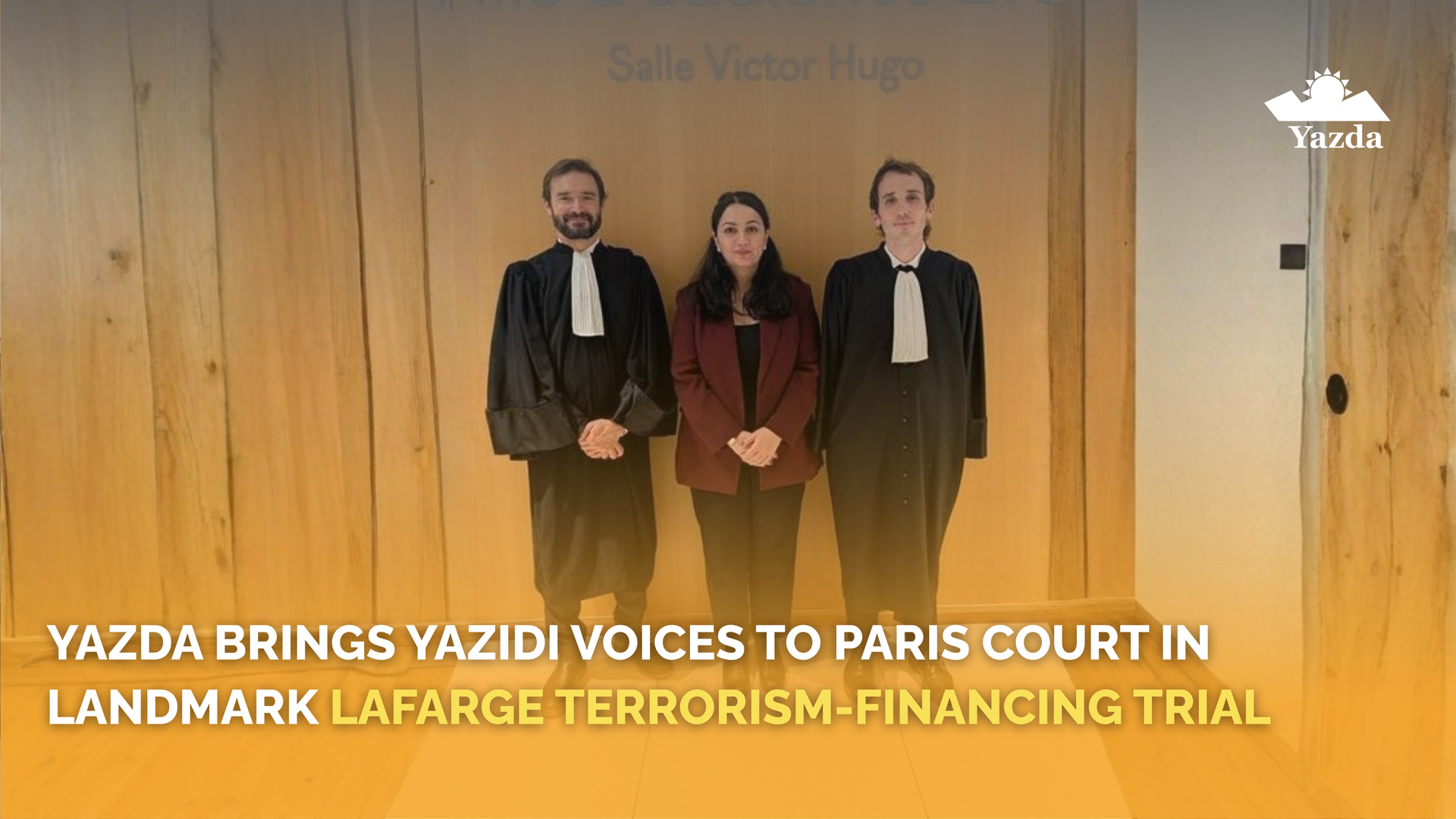
Date: 10 December 2025 Yesterday, Yazda’s Executive Director, Natia Navrouzov, addressed the Paris Judicial Court in the ongoing proceedings concerning the alleged financing of terrorism by French cement company Lafarge. She underscored the important role of civil society in these cases: “We work with resources that are negligible compared to those of a multinational like Lafarge. Yet it is often NGOs that allow the truth to emerge: thanks to them, mass graves are identified, survivors find the courage to testify, and cases reach courts such as this one.” Now entering its peniultimate week, the trial examines Lafarge’s and several former executives’ alleged involvement in financing terrorist groups, including ISIL, Jabhat al-Nusra, and Ahrar al-Sham. The company is accused of authorizing approximately €5 million in “security payments” between 2012 and 2014 to ensure the continued operation of its cement plant in Jalabiya, Syria. Testimonies from former employees over recent weeks have described how Lafarge insisted on keeping the factory running despite kidnappings at checkpoints, airstrikes by regime forces, and the escalating threat from armed groups. Evidence presented in court, including internal emails and meeting notes, shows that the deteriorating security situation and the payments to terrorist groups were openly discussed within the company. Despite this, those accused claim ignorance of the groups’ terrorist nature and attempt to shift responsibility among themselves. The case further revealed that executives of Lafarge Cement Syria continued to negotiate and deal with ISIL up until September 2014, all while the genocide against the Yazidi people was ongoing. Speaking before the court, Natia Navrouzov stated: “Responsibility does not stop at the gates of a factory. It follows the money, wherever it goes. Each transaction, each concession, each amount transferred strengthens an organization that, at the very same moment, was preparing and carrying out the extermination of an entire community. Financing a terrorist group is never a neutral act.” The prosecutor Aurélie Valente of the French National Anti-Terrorist Prosecutor’s Office (PNAT) , thanking Navrouzov for her intervention, commended Yazda’s important role not only in documenting the crimes committed against the Yazidis – without which justice could not brought against its perpetrators, but also in supporting survivors in Sinjar and beyond. This trial closes on the 19th of December, but the verdict is not expected before a few months. The investigation into Lafarge’s implication in aiding and abetting crimes against humanity, in which Yazda is also a Civil Party, is still ongoing. Yazda continues to stand with the Yazidi community in the pursuit of truth, justice, and accountability for the crimes committed in Syria and Iraq -END- Download this press release here . Read this Press Release in Arabic here . ### For media inquiries, please contact: info@yazda.org About Yazda: Yazda is a non-governmental, non-profit organization that was established in 2014 in response to the genocide committed by the self-declared Islamic State (ISIS) against the Yazidis and other minorities in Iraq. Yazda manages a portfolio of humanitarian, justice, advocacy, and development-related projects, all of which are community and survivor-centered in terms of design and implementation. Since its inception, Yazda has been working with local and international partners to provide humanitarian, accountability, and advocacy services to vulnerable minority groups in Iraq in their post-genocide recovery. The organization has been operating in Iraq since October 2014 and has main offices in Duhok in the Kurdistan Region of Iraq and a branch office in Sinjar in Nineveh Province. Yazda is registered as a non-profit organization in the United States, the United Kingdom, Iraq, Kurdistan Region of Iraq. Over the past 8 years, Yazda has grown to employ around 80 staff on average, received support from numerous donors, both institutional and individual, and has reached tens of thousands of direct and indirect beneficiaries through its programs and initiatives.
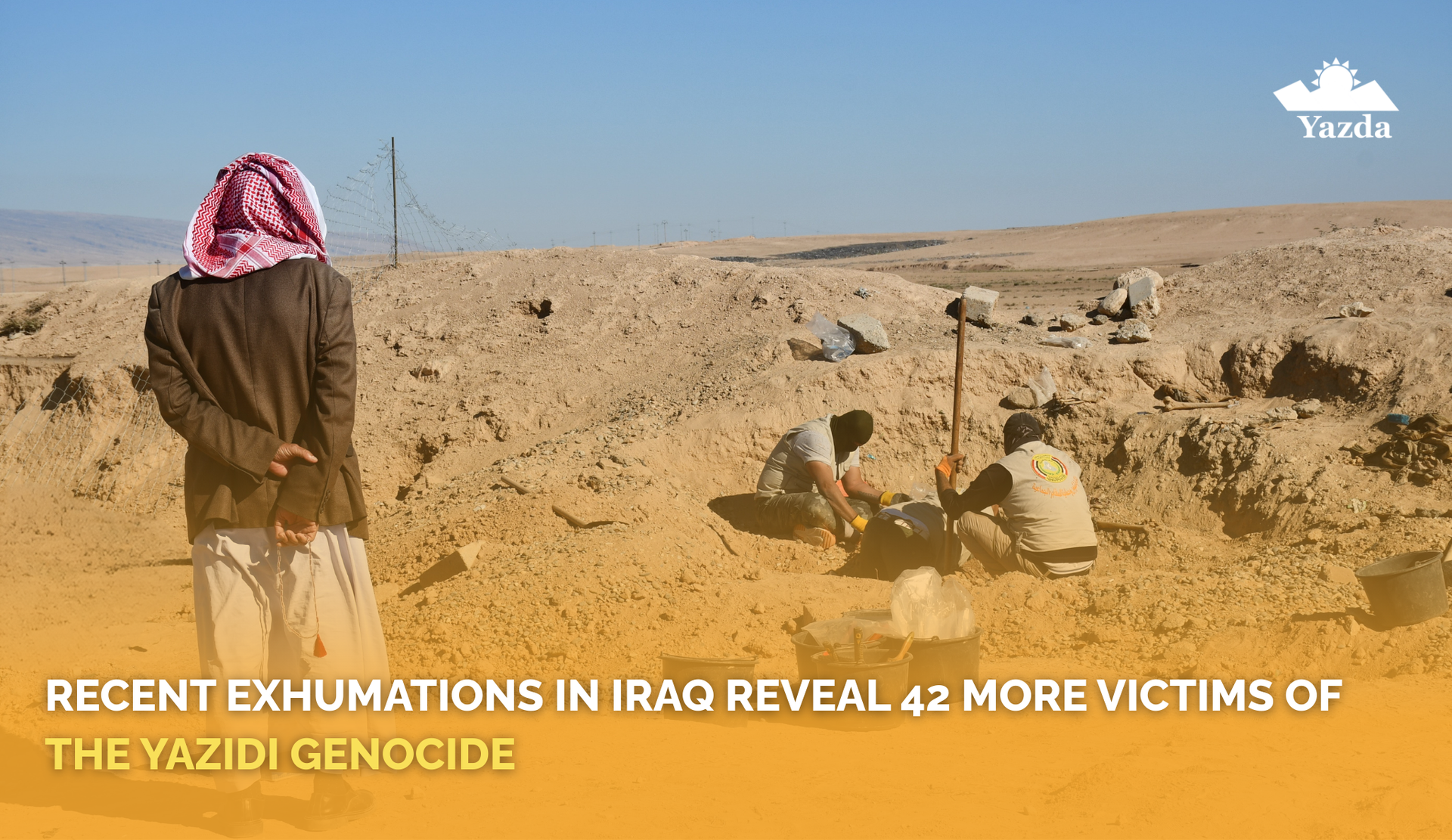
Date: 4 December 2025 From 16th to 27th November 2025 , eight new mass graves containing the remains of at least 42 victims were exhumed in the districts of Sinjar and Al-Baa'j. The process was carried out by the Mass Graves and Missing Persons Directorate (MGMPD) at the Martyrs’ Foundation, and the Medical Legal Directorate (MLD) at the Ministry of Health, in coordination with the International Commission on Missing Persons (ICMP). From 3rd of August 2014 onwards, ISIL attacked over 50 villages and collectives in Sinar, carrying out a genocidal campaign. In the first days of the attacks, thousands of people were killed and later, over 90 mass graves were discovered. Since March 2019 and by now, 82 mass graves have been exhumed and the remains of 770 victims discovered, among which 297 have been identified and buried. The eight new mass graves were exhumed in Siba Sheikh Kheder, Tel-Yousifka, Sinjar District Center, Tel-Banat collective, Um-Shababit, and Sheikh Khenes village. The exhumation of a mass grave in Hardan was also resumed. Additionally, the technical teams conducted an initial forensic assessment of another mass grave located in Al-Basateen neighborhood within Sinjar district center, with plans to exhume this site next year. The efforts of the national technical teams in excavating mass graves represent an exceptional undertaking, given the high level of technical expertise required, the precision needed in handling human remains, and the strict adherence to humanitarian and legal standards. These efforts constitute a fundamental step in uncovering the fate of the missing, documenting evidence, and upholding the rights of families in truth, investigation, and justice. Yazda’s team accompanied the national teams throughout this mission, as part of its ongoing commitment to supporting families of the victims. Since the beginning of this process, Yazda has remained consistently present in the field to help ensure that excavation efforts continue, and that families are supported in their pursuit of truth, dignity, and justice. Yazda has documented crime scenes in Sinjar since 2015 and attended exhumation processes since 2019 to ensure the interests of the community are upheld and evidence is preserved for historical record. -END- Download this press release here . Read this Press Release in Arabic here . ### For media inquiries, please contact: info@yazda.org About Yazda : Yazda is a non-governmental, non-profit organization that was established in 2014 in response to the genocide committed by the self-declared Islamic State (ISIS) against the Yazidis and other minorities in Iraq. Yazda manages a portfolio of humanitarian, justice, advocacy, and development-related projects, all of which are community and survivor-centered in terms of design and implementation. Since its inception, Yazda has been working with local and international partners to provide humanitarian, accountability, and advocacy services to vulnerable minority groups in Iraq in their post-genocide recovery. The organization has been operating in Iraq since October 2014 and has main offices in Duhok in the Kurdistan Region of Iraq and a branch office in Sinjar in Nineveh Province. Yazda is registered as a non-profit organization in the United States, the United Kingdom, Iraq, Kurdistan Region of Iraq. Over the past 8 years, Yazda has grown to employ around 80 staff on average, received support from numerous donors, both institutional and individual, and has reached tens of thousands of direct and indirect beneficiaries through its programs and initiatives.
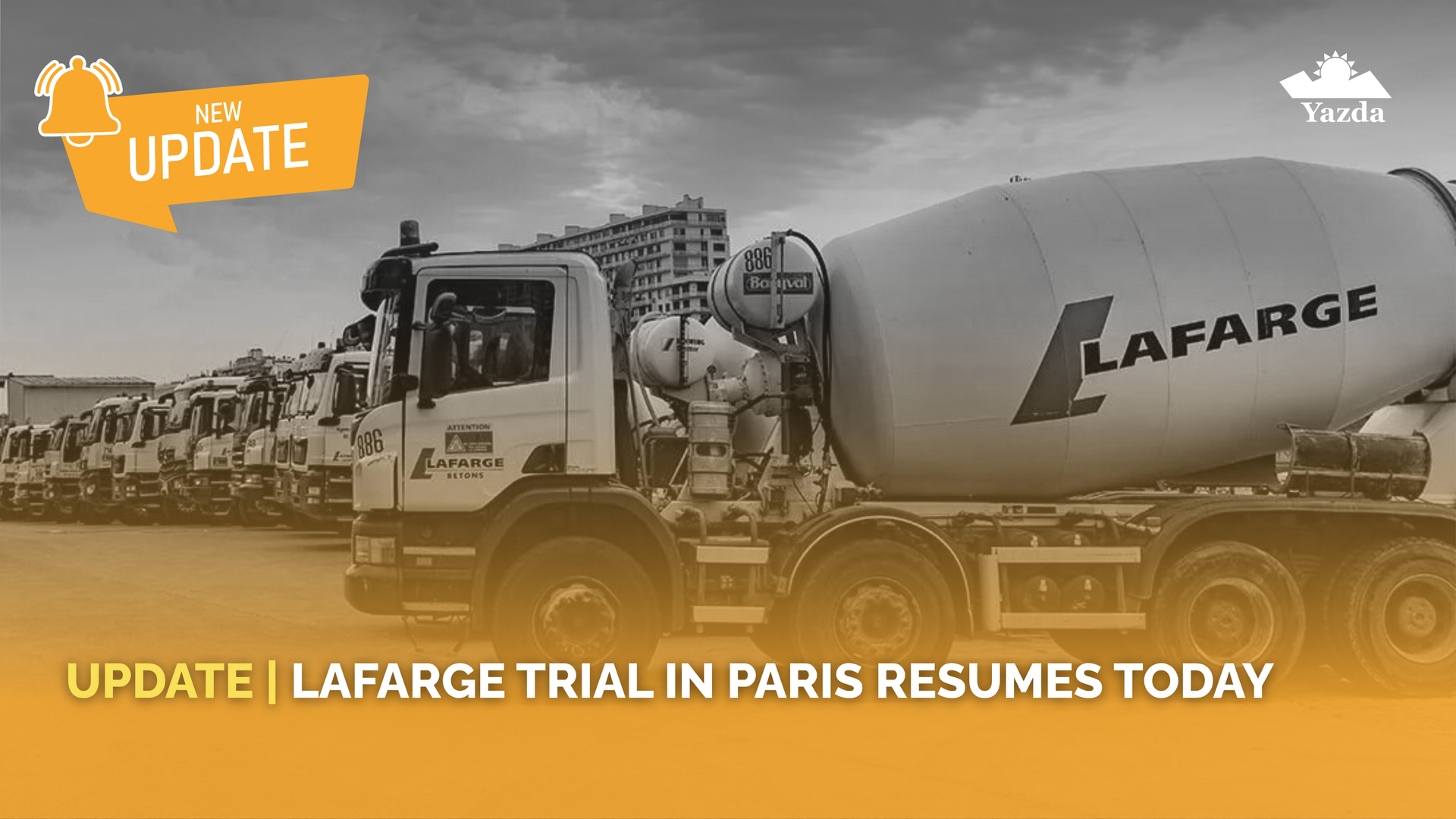
Date: 18 November The trial against the French industrial group Lafarge, its former directors, and various intermediaries for financing terrorism and breaching international sanctions will reopen today. An error in the date of the charges raised by the defendants has led to a suspension of the trial for almost two weeks, but it was corrected by the investigating judges and the trial can now resume. The trial is scheduled to close on 19 December 2025 and Yazda will be present throughout the proceedings to keep the community informed of any developments. The judicial investigation on Lafarge’s implication in crimes against humanity is still ongoing. Yazda emphasizes the importance of these historic proceedings, reiterating its commitment to seeking justice for the Yazidi community and all victims of ISIL.
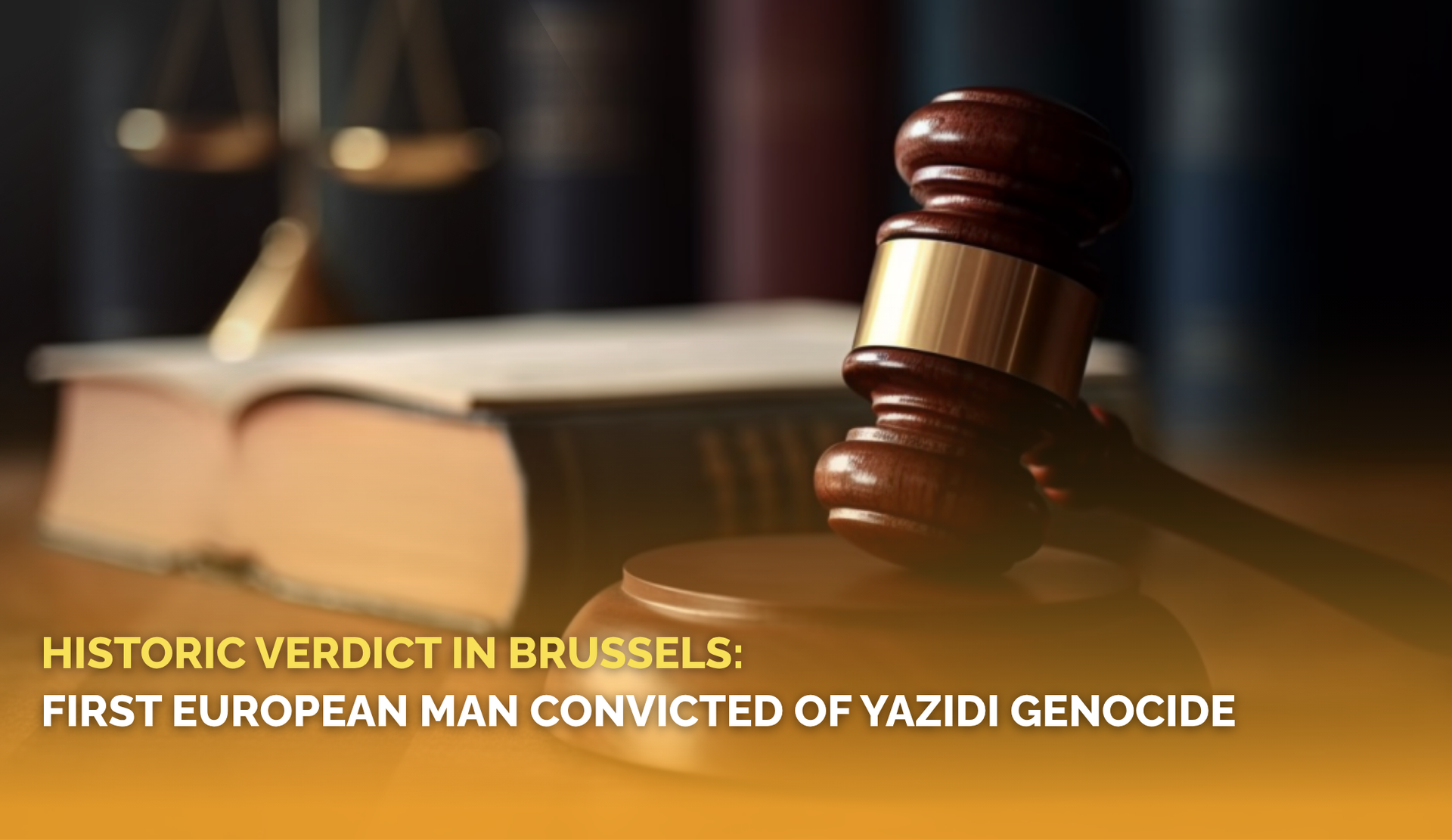
Date: 14 November 2025 Brussels, Belgium: On 13 November 2025, the Assize Court in Brussels convicted ISIL member Sammy Djedou, known under his nom de guerre Abu Mussab Al Baljiki, of genocide and crimes against humanity. He is the first European man being convicted of these crimes. The trial was held in absentia since Djedou is presumed to have been killed in an airstrike in Raqqa in 2016. The public prosecutor stated that the crimes committed against the Yazidi victims were part of a broader intended plan to destroy the Yazidi community in whole or in part, thus amount to genocide and crimes against humanity. The trial, which is the first of its kind in Belgium, opened on 6 November 2025 and even though Djedou is presumed dead, is of great importance to Yazidi victims and other communities that suffered under ISIL’s rule. Three Yazidi survivors who were subjected to slavery and sexual enslavement participated as civil parties, with two of them testifying. Djedou and his wife inflicted rapes, beatings and deprivations of food on the three victims between August 2014 and 2016, while at least two of the three were still minors. This trial not only sheds light on how the genocide against the Yazidi was carried out, but also emphasizes the role of Sammy Djedou in ISIL propaganda and the spread of its ideology. He was born in the outskirts of Brussels in 1989 and left for Syria in 2012, where he married a Syrian woman. Djedou worked closely with the then ISIL spokesperson Taha Sobhi (Abu Muhammad al Adnani) and played a major role in the planning of the November 2015 Paris attacks (for which ten years were commemorated on the same day) and the 2016 Brussels. Additionally, the case raises questions about the role of families of foreign members in crimes committed against Yazidis. The investigation confirmed that Djedou’s family in Belgium was in contact with him at the time the crimes against all the three Yazidi victims were committed. The family provided him with financial means while he stayed in Syria. Djedou’s mother, Véronique L., has faced charges on the basis of financially enabling a terrorist group to carry out crimes of an international nature. Yazda salutes the courage of the survivors and witnesses to come forward and testify about the ordeals they went through. Natia Navrouzov, Executive Director at Yazda, stated: “Despite the fact that thousands of European nationals joined ISIL, this is the first time, more than a decade later, that one has been convicted for genocide against Yazidis, and even then, only in absentia. It is an important step, but it also highlights how much more remains to be done. As in other landmark cases, the survivors’ courage is the driving force behind this outcome. Their willingness to testify made this verdict possible. We commend Belgium for taking this important step toward justice and urge more states to match this level of commitment.” -END- Download this press release here . ### For media inquiries, please contact: info@yazda.org About Yazda: Yazda is a non-governmental, non-profit organization that was established in 2014 in response to the genocide committed by the self-declared Islamic State (ISIS) against the Yazidis and other minorities in Iraq. Yazda manages a portfolio of humanitarian, justice, advocacy, and development-related projects, all of which are community and survivor-centered in terms of design and implementation. Since its inception, Yazda has been working with local and international partners to provide humanitarian, accountability, and advocacy services to vulnerable minority groups in Iraq in their post-genocide recovery. The organization has been operating in Iraq since October 2014 and has main offices in Duhok in the Kurdistan Region of Iraq and a branch office in Sinjar in Nineveh Province. Yazda is registered as a non-profit organization in the United States, the United Kingdom, Iraq, Kurdistan Region of Iraq. Over the past 8 years, Yazda has grown to employ around 80 staff on average, received support from numerous donors, both institutional and individual, and has reached tens of thousands of direct and indirect beneficiaries through its programs and initiatives.
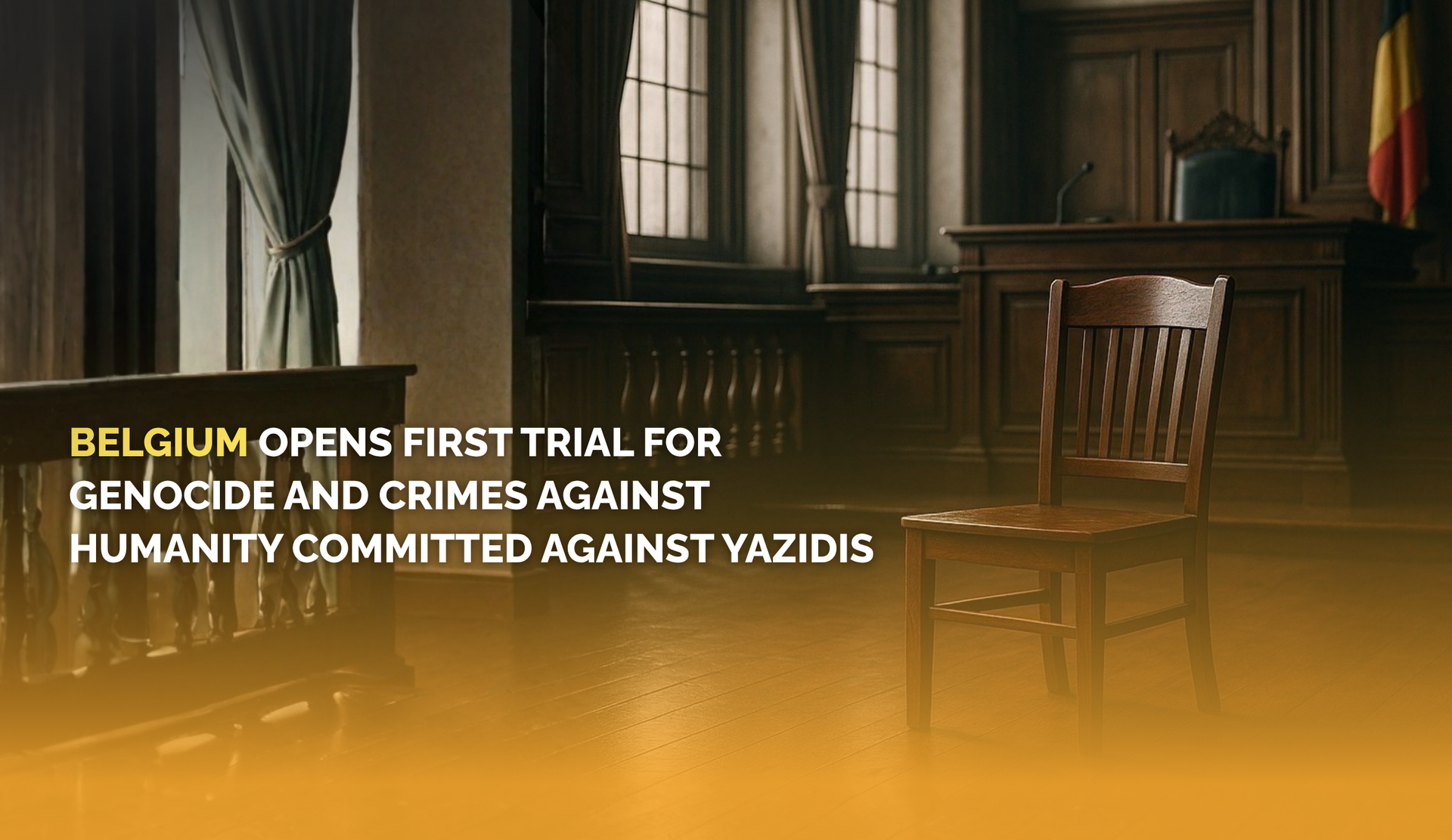
Date: 6 November 2025 Brussels, Belgium: Today, the trial against the Islamic State in Iraq and the Levant (ISIL) member Sammy Djedou begins before the Assize Court of Brussels. Djedou, who will be tried in absentia (the trial is held without the presence of the accused), faces charges of genocide and crimes against humanity against Yazidi survivors. This is a landmark case, as it is the first time Belgium prosecutes an individual for genocide and crimes against humanity against members of the Yazidi community, following similar trials held in Germany, the Netherlands, and Sweden, with France expected to follow in early 2026. The now 36-year-old Belgian travelled to Syria in 2012 to join ISIL, where he adopted the nom de guerre Abu Mousaab al-Belgiki. Since his departure, Djedou has never returned, and is presumed dead, likely killed on December 4, 2016, in a US drone strike in Raqqa, Syria. The Federal Public Prosecutor's office opened a judicial case against Djedou on 12 October 2021, charging him with genocide, and rape and sexual slavery as crimes against humanity. In particular, Djedou is accused of having allegedly raped and sexually enslaved three Yazidi women, including minors, between 1 November 2014 and 31 December 2016. The survivors, now in their late twenties, will participate in the trial as civil parties. Natia Navrouzov, Executive Director at Yazda, commented: “This first in absentia trial of an ISIL member for crimes against Yazidis remains a powerful tool for justice. Many ISIL members, especially men, were killed before they could be brought to court, but accountability must not die with them. Djedou is also the first European man charged with genocide and crimes against humanity against the Yazidis, exposing the persistent failures of European states to repatriate and prosecute their male nationals. As the situation in Syria evolves, this case shows that justice is still possible and that political inaction can no longer be an excuse. Despite the open dialogue with the new Syrian government, thousands of European nationals remain in camps in Syria. European countries must find a comprehensive solution instead of leaving the burden to Iraq and Syria, while ignoring survivors’ calls for meaningful justice.” Yazda will monitor the legal proceedings, and will keep the community informed of any developments, reiterating its commitment to seeking justice for the Yazidi community and all victims of ISIL. -END- Download this press release here . Read this Press Release in Arabic here . ### For media inquiries, please contact: info@yazda.org About Yazda: Yazda is a non-governmental, non-profit organization that was established in 2014 in response to the genocide committed by the self-declared Islamic State (ISIS) against the Yazidis and other minorities in Iraq. Yazda manages a portfolio of humanitarian, justice, advocacy, and development-related projects, all of which are community and survivor-centered in terms of design and implementation. Since its inception, Yazda has been working with local and international partners to provide humanitarian, accountability, and advocacy services to vulnerable minority groups in Iraq in their post-genocide recovery. The organization has been operating in Iraq since October 2014 and has main offices in Duhok in the Kurdistan Region of Iraq and a branch office in Sinjar in Nineveh Province. Yazda is registered as a non-profit organization in the United States, the United Kingdom, Iraq, Kurdistan Region of Iraq. Over the past 8 years, Yazda has grown to employ around 80 staff on average, received support from numerous donors, both institutional and individual, and has reached tens of thousands of direct and indirect beneficiaries through its programs and initiatives.
